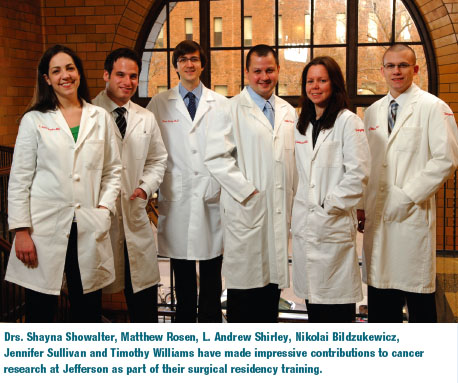
Recommended Citation
(2009)
"Surgical Residents Make Significant Contributions to Ongoing Cancer Research,"
Jefferson Surgical Solutions: Vol. 4:
Iss.
1, Article 6.
Available at:
https://jdc.jefferson.edu/jss/vol4/iss1/6

The Department of Surgery’s research efforts have expanded greatly in recent years as evidenced by the breadth and depth of resident research projects.
Dr. L. Andrew Shirley spent two years in the laboratory and was the Principal Investigator of a study analyzing the role of the Dachshund (DACH1) cell fate determination pathway in various cancer types, including breast, prostate, colorectal, and pancreatic cancers. The study, funded by a Radiation Therapy Oncology Group Translational Research Program seed grant, was conducted under the mentorship of Richard Pestell, MD, PhD, Director of the Kimmel Cancer Center. Dr. Shirley presented the findings at the 3rd Annual Academic Surgical Congress and in four peer-reviewed articles.
Jonathan Brody, PhD, a specialist in pancreatic cancer research has mentored several residents in his laboratory. Dr. Shayna Showalter explored targets in pancreatic cancer to develop novel therapeutic strategies and examined the effect of naturally occurring Vitamin K on pancreatic cancer cells. She found that Vitamin K actually inhibits pancreatic cancer cell growth. Dr. Showalter also used novel nanoparticle technology to deliver diphtheria toxin specifically to pancreatic cancer cells, therefore killing the cancer cells without effecting the growth of normal, noncancer cells. To date, she has presented the findings at three meetings, including the American Association for Cancer Research Annual Meeting, and in three peer-reviewed articles.
Also under Dr. Brody’s mentorship, Dr. Timothy Williams investigated the tumor suppressor protein pp32 and its role in pancreatic tumor development. The research established that pp32 is low or absent in poorly differentiated pancreatic cancer, it suppresses tumor growth when its expression is restored, and impacts the response of cancer cells to certain chemotherapy drugs commonly used to treat pancreatic cancer. To date, Dr. Williams has published three peerreviewed publications on this research, presented posters at three meetings and shares the Award for Best Research Presentation in the Department of Surgery.
Dr. Nikolai Bildzukewicz is continuing the work established by Dr. Williams on the role of pp32 in a drug resistance pathway. However, his primary research focuses on Poly(ADP Ribose) Polymerase- 1 (PARP-1), an enzyme found within the cell nucleus that serves many cellular functions including repair of damaged DNA. In collaboration with John Pascal, PhD, Assistant Professor of Biochemistry and Molecular Biology, Dr. Bildzukewicz is working with both normal and mutant forms of the enzyme in pancreatic cancer cells. His findings include the concept of using novel agents, PARP-inhibitors, to sensitize pancreatic cancer cells to platinum-based FDA-approved drugs. This work provides the proof-of-principle data for a proposed clinical trial. Dr. Bildzukewicz presented the initial findings to the Philadelphia Academy of Surgery meeting in February 2008.
In Dr. Susan Lanza-Jacoby’s laboratory, Dr. Matthew Rosen is studying the effect of Nexrutine, a natural Cox-2 inhibitor on pancreatic cancer cells, and the relationship of sirtuin (a protein involved in improving health during calorie restriction) to pancreatic cancer. Dr. Rosen has already presented findings at two meetings including the American Association of Cancer Research. Dr. Rosen is also the recipient of the Arnold P. Gold Foundation Humanism and Excellence in Teaching Award.
In Dr. Hwyda Arafat’s laboratory, Dr. Jennifer Sullivan is analyzing how nictotine exposure contributes to the aggressive nature of pancreatic cancer. Her research focuses on the expression of a protein, Osteopontin-C, which appears to be increased in patients with pancreatic cancer, especially those with a history of smoking. This protein could be a potential target for future therapy.

